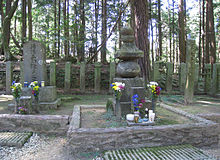- Ōtani Yoshitsugu
-
In this Japanese name, the family name is "Ōtani".
Ōtani Yoshitsugu (大谷 吉継, 1559 – October 21, 1600) was a Japanese samurai of the Sengoku period though Azuchi-Momoyama Period. He was also known by his court title, Gyōbu-shōyū (刑部少輔). He was born in 1559 to a father who was said to be a retainer of either Ōtomo Sōrin or of Rokkaku Yoshikata. He become one of Toyotomi Hideyoshi's followers. He participated in the Kyushu campaign, and was sent to Korea as one of the Three Bureaucrats with Mashita Nagamori and Ishida Mitsunari.
Life
Ōtani Yoshitsugu is well known in Japan for two main aspects: his leprosy, and his friendship.[1] Supposedly he was one who put friendship before anything (although obviously such a subjective matter is hard to determine), and it may have been in Korea that Ishida and Ōtani, working together, formed their legendary friendship. There is even an anecdote concerning this friendship, which goes something like this: A secret tea party was being held, and all those invited were passing around a cup of tea. As Ōtani Yoshitsugu took a sip, some pus from his face dropped into the cup. Yoshitsugu discovered this, but too late: the cup was already being passed around. The people who took sips after this all had horrified expressions on their faces, but when it came to Mitsunari's turn, he calmly drank all the remaining tea, pus and all. Yoshitsugu was amazed: "This Mitsunari is an extraordinary man!"[citation needed]
Before the Battle of Sekigahara, Yoshitsugu was said to have repeatedly tried to persuade Mitsunari of the futility of his actions. However, at seeing the staunchness of his friend's convictions, Yoshitsugu joined his cause after mulling it over for several days. At the time, Yoshitsugu's health was deteriorating, making him nearly blind. He could not stand up, let alone fight. He was led to the battleground in a palanquin.
Yoshitsugu was at the head of about 600 men, with another 4000 or so under Toda Shigemasa, Hiratsuka Tamehiro, Ōtani Yoshikatsu (his son), and Kinoshita Yoritsugu. As the battle raged on, Kobayakawa Hideaki, who was situated above Yoshitsugu on Mount Matsuo, didn't move, despite repeated calls from Ishida Mitsunari. Yoshitsugu suspected something, and thus called for his troops to position themselves so as to prepare for a possible attack from their flanks. His hunch was right, as following a stimulatory gun volley from Ieyasu's position, Kobayakawa Hideaki and his troops rushed down the mountain towards Yoshitsugu's position. This movement was immediately followed by Akaza Naoyasu, Ogawa Suketada, Kutsuki Mototsuna, and Wakizaka Yasuharu, a total of over 20,000 troops.
Yoshitsugu's troops fought back, at one point even driving back Kobayakawa's troops partway up the mountain, but in the end, sheer numbers took their toll. While this was happening, Yoshitsugu, unable to see, repeatedly asked one of his retainers, Yuasa Gosuke, "Is it lost?" When the latter finally answered in the affirmative, Yoshitsugu asked him to cut his head off. He was then beheaded by his retainer, who also committed seppuku.
In fiction
Yoshitsugu is one of the Western army's units in the strategy video game Kessen.
Yoshitsugu is the inspiration for the fictional Lord Onoshi in James Clavell's novel Shōgun.
Yoshitsugu becomes playable character in Sengoku Basara 3, using several orbs as weapon, and has apparent supernatural abilities. He is portrayed as being very pessimistic and sadomasochistic, often commenting on how much he enjoys watching the other characters suffer (except for Mitsunari).
References
- ^ Bryant A (1995). Sekigahara 1600: The Final Struggle for Power (Campaign Series, 40). Osprey Publishing (UK). ISBN 1-85532-395-8. http://books.google.com/books?hl=en&lr=&id=UzhzhxfmncsC&oi=fnd&pg=PA24&dq=Otani+Yoshitsugu+leprosy&ots=5wMWO7APjC&sig=65aiqXJqXJKEaFCWD7sFpWDPAwM#v=onepage&q=Otani%20Yoshitsugu%20leprosy&f=false. Retrieved 2010-02-28.
- Otani Yoshitsugu Profile [1] (Japanese)
Wikimedia Foundation. 2010.

